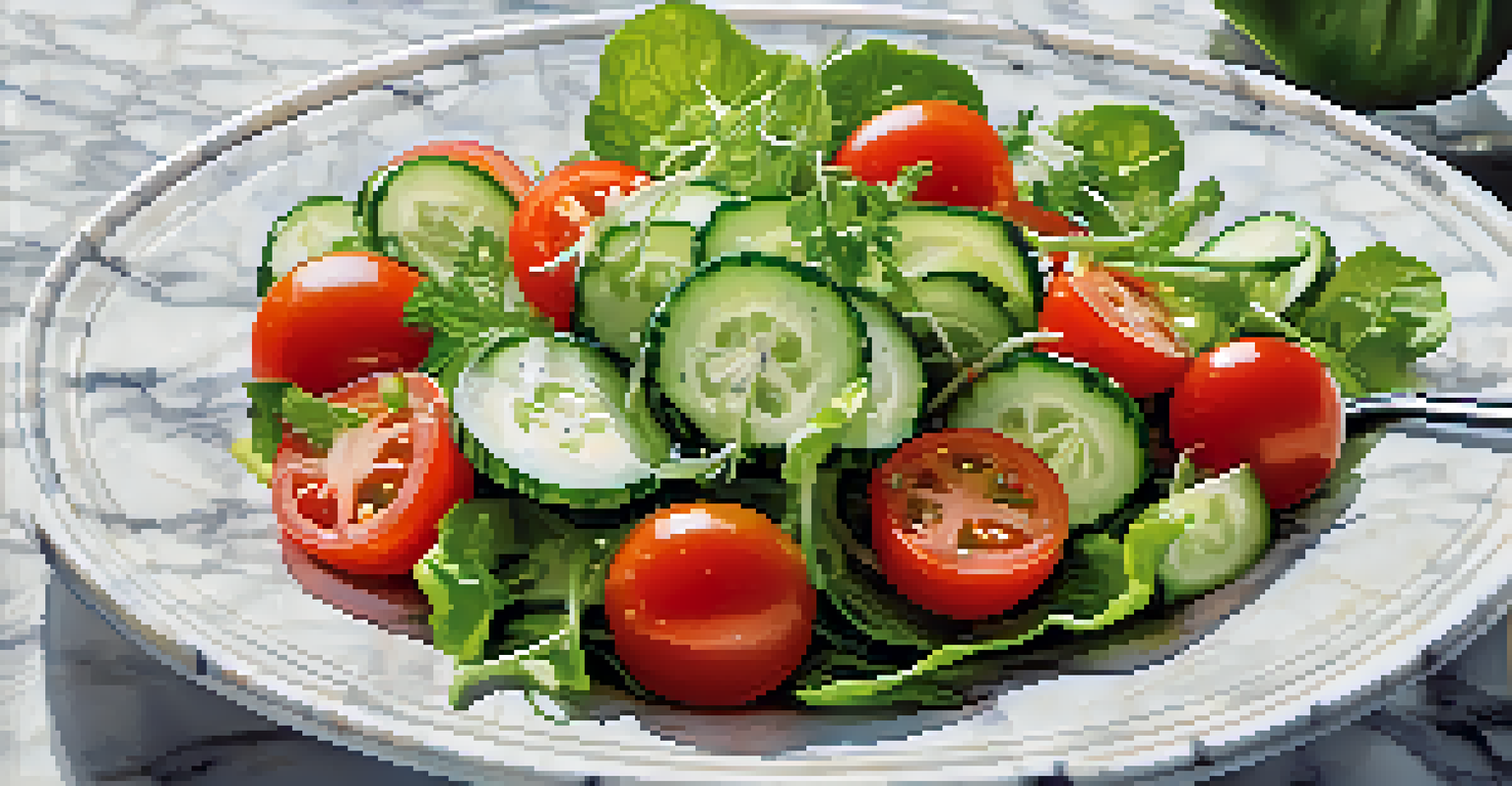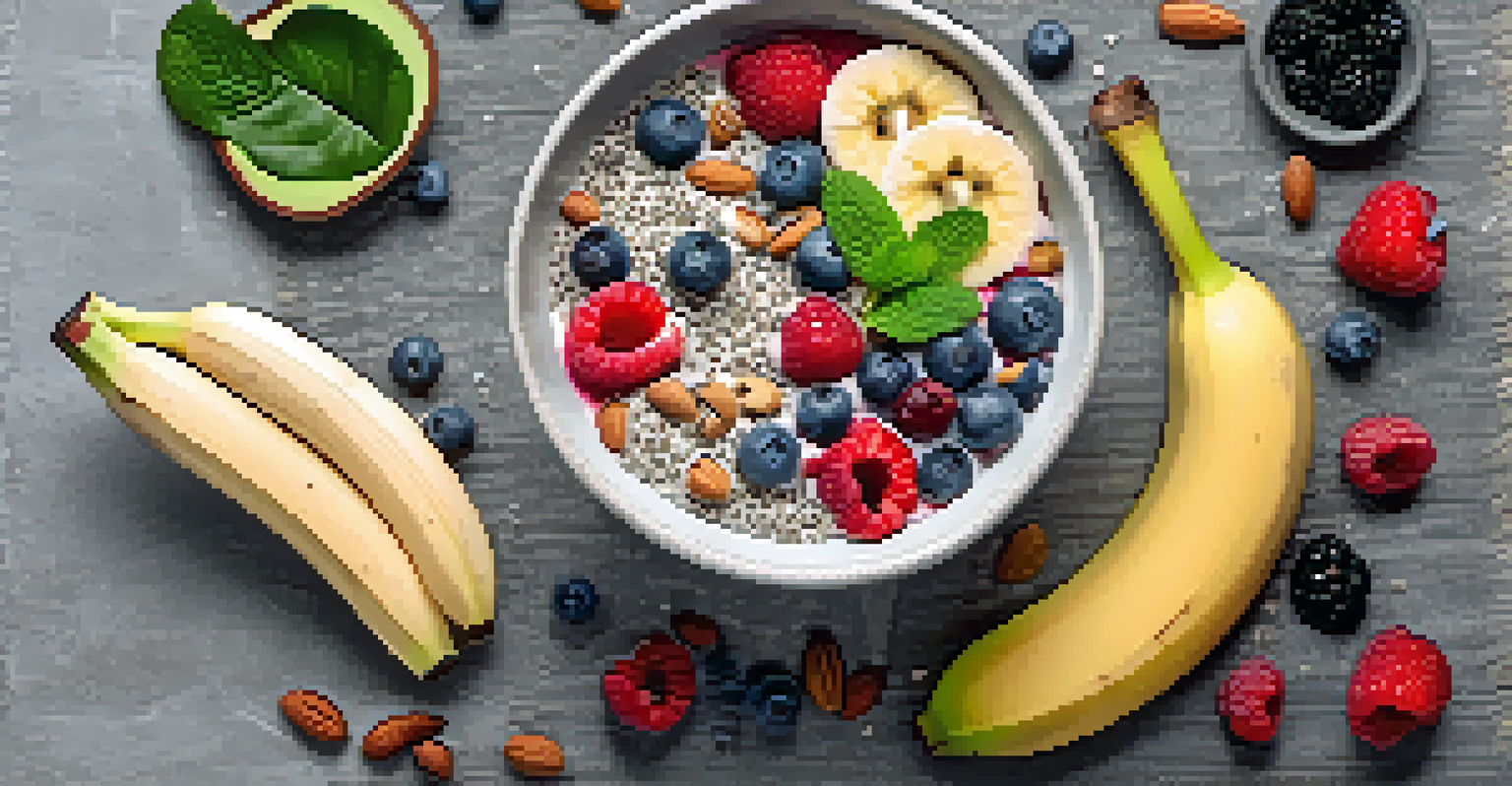The Connection Between Raw Foods and Enhanced Brain Function

Understanding Raw Foods and Their Benefits
Raw foods, which include fruits, vegetables, nuts, and seeds, are consumed in their natural state without cooking. This preservation of nutrients is a key reason why many health enthusiasts advocate for a raw food diet. Nutrients like vitamins, minerals, and enzymes are often lost during cooking, making raw options more appealing for those looking to enhance their overall health.
Let food be thy medicine and medicine be thy food.
Eating raw foods is not just about nutrition; it also taps into a holistic approach to wellness. The idea is that by consuming food in its purest form, you’re giving your body the best chance to thrive. This concept can easily extend to brain health, where the right nutrients can lead to improved cognitive function.
With a focus on plant-based ingredients, raw food diets are rich in antioxidants and anti-inflammatory properties. These compounds are essential for protecting the brain from oxidative stress and inflammation, both of which can negatively impact cognitive performance.
Key Nutrients in Raw Foods that Boost Brain Function
Certain nutrients are particularly beneficial for brain health, and many of them are abundant in raw foods. Omega-3 fatty acids, for example, found in flaxseeds and walnuts, are crucial for maintaining the structure and function of brain cells. They help support memory and cognitive performance, making them a staple for those seeking to enhance their brain function.

Antioxidants, such as vitamin C and vitamin E, also play a vital role. These nutrients combat oxidative stress, which can damage brain cells and contribute to cognitive decline. Raw fruits like berries and citrus are excellent sources of these protective compounds.
Raw Foods Enhance Brain Health
Consuming raw foods rich in nutrients like omega-3 fatty acids and antioxidants can significantly boost cognitive function and memory retention.
Moreover, raw vegetables, especially leafy greens, provide vital nutrients like folate and magnesium, which are linked to improved mood and cognitive abilities. When combined, these nutrients create a powerful synergy that promotes optimal brain health.
The Role of Hydration in Cognitive Performance
Hydration is often overlooked but is crucial for maintaining brain function. Raw foods, particularly fruits and vegetables, have high water content, helping you stay hydrated while also nourishing your body. Staying hydrated can improve concentration and mental clarity, making it easier to tackle daily challenges.
You are what you eat, so don't be fast, cheap, easy, or fake.
Dehydration, even in mild forms, can lead to decreased attention and memory problems. By incorporating hydrating raw foods into your diet, you can support not only your physical health but also your cognitive abilities. Think of foods like cucumbers, watermelon, and oranges as brain boosters packed with hydration.
Furthermore, maintaining fluid balance is key for overall brain function. Adequate hydration ensures that nutrients can be delivered efficiently to brain cells, supporting optimal performance and mental agility.
How Raw Foods Affect Mood and Mental Clarity
The connection between diet and mood is well-documented, and raw foods can play a significant role in promoting emotional well-being. Many raw foods are rich in tryptophan, an amino acid that helps produce serotonin, often referred to as the 'feel-good' hormone. This can lead to improved mood and better stress management.
Moreover, consuming a variety of colorful fruits and vegetables can enhance mental clarity. The vibrant pigments found in these foods often indicate high antioxidant content, which can help reduce mental fatigue and increase focus. By choosing a rainbow of raw foods, you’re fueling your brain with the nutrients it craves.
Hydration Supports Mental Clarity
Incorporating hydrating raw fruits and vegetables not only nourishes the body but also improves concentration and overall brain performance.
Incorporating raw foods into your diet can also foster a greater sense of connection to your meals. This mindfulness can enhance your overall relationship with food, further contributing to improved mental health and emotional stability.
Raw Foods and Their Impact on Memory Retention
Memory retention is a critical aspect of cognitive function, and certain raw foods can enhance this ability. For instance, blueberries are known for their memory-boosting properties due to their high levels of antioxidants. Regular consumption can lead to improved memory and cognitive longevity.
Additionally, nuts like almonds and walnuts contain vitamin E, which has been linked to reduced cognitive decline in older adults. Including these in your raw diet can provide a tasty way to support memory retention across all ages.
By incorporating a variety of raw foods into your daily routine, you can create a nutrient-rich environment that enhances your brain's ability to store and retrieve information effectively.
The Importance of a Balanced Raw Food Diet
While raw foods offer numerous benefits, balance is essential for optimal brain function. A solely raw diet may lack certain nutrients, such as vitamin B12 and iron, which are crucial for cognitive health. It’s important to find a balance that combines raw foods with other healthy options to ensure you're meeting all your dietary needs.
Incorporating elements like whole grains or lean proteins can enhance your diet without sacrificing the benefits of raw foods. This approach not only helps maintain cognitive function but also supports overall health.
Balanced Diet is Key for Nutrition
A balanced approach that combines raw foods with other healthy options ensures you meet all dietary needs for optimal cognitive health.
Consider your individual needs and preferences when crafting your diet. A balanced approach allows for flexibility while still prioritizing the advantages of raw ingredients.
Practical Tips for Incorporating Raw Foods into Your Diet
Making the shift to include more raw foods in your diet doesn’t have to be daunting. Start small by adding raw snacks like carrots and hummus or apple slices with peanut butter to your routine. These simple changes can make a big difference in how you feel and function mentally.
Experimenting with raw recipes can also be a fun way to explore new flavors and textures. Try making raw smoothies, salads, or energy bites that highlight the vibrant ingredients available. The creativity involved can keep your meals exciting and enjoyable.

Lastly, listen to your body and adjust your intake based on how you feel. Everyone's nutritional needs are different, and tuning in to your body’s signals can help you find the right balance of raw foods that support your brain health effectively.